
Marilyn Jeanne Seely is an American singer, songwriter, record producer, actress and author. Most notably identified with the country music genre, Seely found success with the Grammy Award-winning song "Don't Touch Me" (1966). Her soul-inspired vocal delivery gave her the nickname of "Miss Country Soul". Seely is also known for her membership and presence on the Grand Ole Opry, having appeared more times on the program than any other performer.
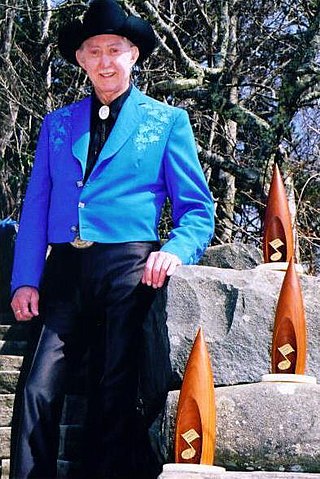
Jack Henry Greene was an American country musician. Nicknamed the "Jolly Greene Giant" due to his height and deep voice, Greene was a long time member of the Grand Ole Opry. A three-time Grammy Award nominee, Greene is best known for his 1966 hit, "There Goes My Everything". The song dominated the country music charts for nearly two months in 1967 and earned Greene "Male Vocalist of the Year", "Single of the Year", "Album of the Year" and "Song of the Year" honors from the Country Music Association. Greene had a total of five No. 1 country hits and three others that reached the top ten. Billboard magazine named Greene one of the Top 100 "Most Played Artists".

"Don't Touch Me" is a song written by Hank Cochran. It was originally written for and recorded by American country artist Jeannie Seely. The song was released as a single on Monument Records in March 1966 and became a major Billboard country hit. "Don't Touch Me" became Seely's signature song and her biggest hit as a solo artist. It would later appear on her debut studio album and be re-recorded by Seely in later years.

The discography of American country artist Jeannie Seely contains 17 studio albums, four compilation albums, one soundtrack album, four music videos, ten album appearances and 36 singles. Her first singles were for the Challenge label before 1966's "Don't Touch Me". The latter reached number two on the US Billboard Hot Country Singles chart and her only single to reach the Billboard Hot 100, peaking at number 85. The song was included on her debut studio album titled The Seely Style (1966), which reached number eight on the US Billboard Top Country Albums chart.

"It's Only Love" is a song written by Hank Cochran that was originally recorded by American country artist Jeannie Seely. It was released by Monument Records as a single in September 1966, rising to the US country songs top 20. It was given positive reviews from music publications following its release and was included on her debut studio album The Seely Style.

"A Wanderin' Man" is a song written by Hank Cochran that was originally recorded by American country artist Jeannie Seely. Released as a single by Monument Records, it reached the top 20 of the US country songs chart in 1967. It was Seely's third top 20 single in her career and was given positive reviews from music magazines following its release. It appeared on her second studio album called Thanks, Hank!.

"I'll Love You More (Than You'll Need)" is a song written by Hank Cochran that was originally recorded by American country singer Jeannie Seely. Released in 1968 as a single by Monument Records, it became her third top ten single on the US country chart songs chart. The song also served as the title track to Seely's 1968 studio album I'll Love You More and received a positive response from critics following its release.

The Seely Style is the debut studio album of American country artist Jeannie Seely. It was released in September 1966 by Monument Records and was produced by Fred Foster. The album consisted of 12 songs, many of which were covers of songs from the era including some written by Hank Cochran. The lead single, "Don't Touch Me" was also penned by Cochran and became Seely's first commercial success as a recording artist. The album itself reached the top ten on the US country chart. Both Billboard and Cash Box reviewed the album following its original release.
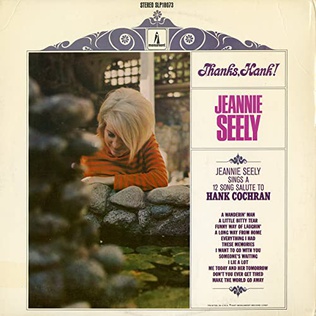
Thanks, Hank! is a studio album by American country artist Jeannie Seely. It was released on May 1967, by Monument Records and was produced by Fred Foster. The album contained songs written entirely by songwriter Hank Cochran, some of which were cover tunes while others were new tracks. Among the new tracks were two singles: the top 20 country song "A Wanderin' Man" and the charting song "These Memories". The LP also made the top 20 of the US country chart. The album received reviews from AllMusic, Cash Box and Record World following its release.
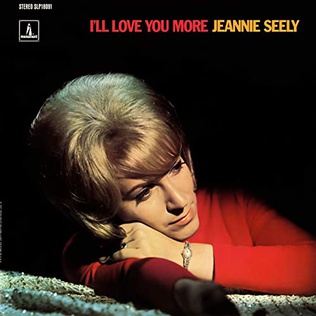
I'll Love You More is a studio album by American country artist Jeannie Seely. It was released by Monument Records in February 1968 and was the third studio album of her career. The project consisted of 11 tracks whose themes centered on heartbreak. Six of the songs were written by Hank Cochran, who helped launch Seely's recording career. Two of the songs were originally singles: "When It's Over" and the title track. The latter single reached the top ten on the US country songs chart in 1968. The album itself reached the top 40 of the US country albums chart following its release. It received reviews and ratings from Billboard, Cash Box and AllMusic.
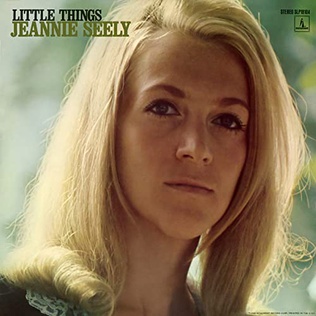
Little Things is a studio album by American country artist Jeannie Seely. It was released on December 1968, by Monument Records and was co-produced by Fred Foster and Jim Malloy. The record was Seely's fourth studio album released in her career and included three singles issued prior to the LP: "Welcome Home to Nothing", "How Is He?" and the title track. Little Things placed inside the top 40 on the US country albums chart and received reviews from both Billboard and Cash Box magazines.
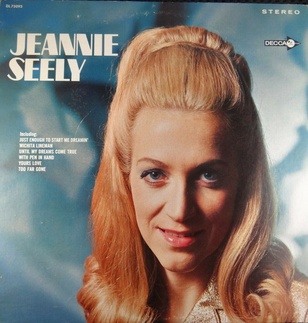
Jeannie Seely is an eponymous studio album by American country artist Jeannie Seely. It was released by Decca Records in April 1969 and was her fifth studio album. The 11-track collection featured songs written by Hank Cochran and others. Many of the songs were cover tunes, with some exceptions such as "Just Enough to Start Me Dreamin'". The latter was the album's only single and made an appearance on the US country chart in 1969. The eponymous release was Seely's first for the Decca label and received reviews from Billboard, Cash Box and Record World magazines.

"Wish I Didn't Have to Miss You" is a song written by Hank Cochran and Dave Kirby. It was originally and released as a duet by American country music artists Jack Greene and Jeannie Seely. Released as a single in October 1969, the song became a number two song on the US country chart in early 1970. The song was given positive reviews from Billboard and Cash Box magazines and would influence the making of their debut studio album in 1970.
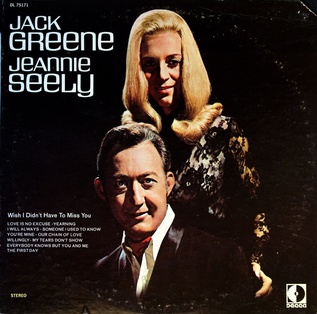
Jack Greene, Jeannie Seely is a studio album by American country music artists Jack Greene and Jeannie Seely. It was released by Decca Records in January 1970 and contained 11 tracks of mostly cover tunes. Although already both having two separate successful country recording careers, Greene and Seely teamed up to record the an album of duets following the success of their single "Wish I Didn't Have to Miss You", which is also included. The LP received positive reviews from Billboard, Cash Box and Record World magazines.
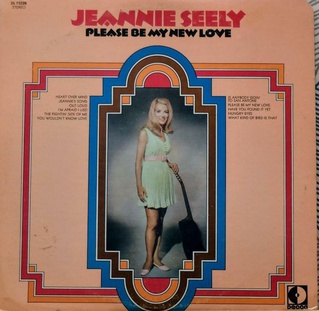
Please Be My New Love is a studio album by American country artist Jeannie Seely. It was released by Decca Records in July 1970 and was the seventh studio album in her career. The record consisted of 11 tracks, including a medley of cover tunes called "Jeannie's Medley". The latter tune and the title track were both released as singles originally. Please Be My New Love was given positive reviews by Billboard and Cash Box magazines.

Two for the Show is a studio album by American country music artists Jack Greene and Jeannie Seely. It was released in January 1973, by Decca Records. It was pair's second studio album as a duet team. The album included two singles that reached the US and Canadian country songs top 20 between 1971 and 1973: "Much Oblige" and "What in the World Has Gone Wrong with Our Love". The latter was co-written by Hank Cochran, who contributed to four additional tracks on the album. Two for the Show also made the US country albums top 40.
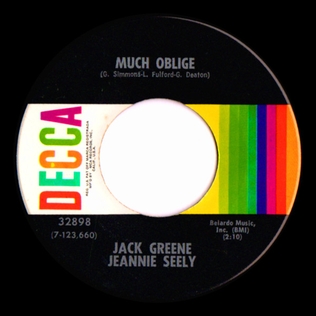
"Much Oblige" is a song written by G. Deaton, R. Fulford and G. Simmons. It was recorded as a duet by American country music artists Jack Greene and Jeannie Seely. Released as a single in November 1971, it reached the top 20 on the US and Canadian country songs charts. The song received reviews from Billboard and Cash Box magazines following its release. It was later included on their studio album Two for the Show.

Can I Sleep in Your Arms/Lucky Ladies is a studio album by American country music artist Jeannie Seely. It was released on November 19, 1973, by MCA Records and was produced by Walter Haynes. It was Seely's first solo studio album in three years and was her first to be issue with the MCA label. The album produced a total of six singles that were originally released between 1970 and 1973. The record is named for its two major hits: "Can I Sleep in Your Arms" and "Lucky Ladies". It would be Seely's final album for the MCA label.

Greatest Hits is a re-recorded studio album by American country artists Jack Greene and Jeannie Seely. It was released in 1982 and was co-produced by Tommy Hill and Moe Lytle for Gusto Records. Although titled as Greatest Hits, the album contained new recordings of songs that Greene and Seely cut for the Gusto label. These recordings were remakes of original tunes that both artists had previously cut themselves.

The discography of American country artist Jack Greene contains 24 studio albums, one live album, four compilation albums, 40 singles and five other charted songs. He gained national attention as a drummer and background vocalist in Ernest Tubb's band. He soon signed a recording contract with Decca Records. Greene's second single, "Ever Since My Baby Went Away", became his first song to chart, reaching number 37 on the Billboard Hot Country Singles chart. Greene's next single, "There Goes My Everything", reached number 1 on the Billboard country chart in December 1966. Becoming his biggest hit, the song also was his only single to reach the Billboard Hot 100, peaking at number 65.




















